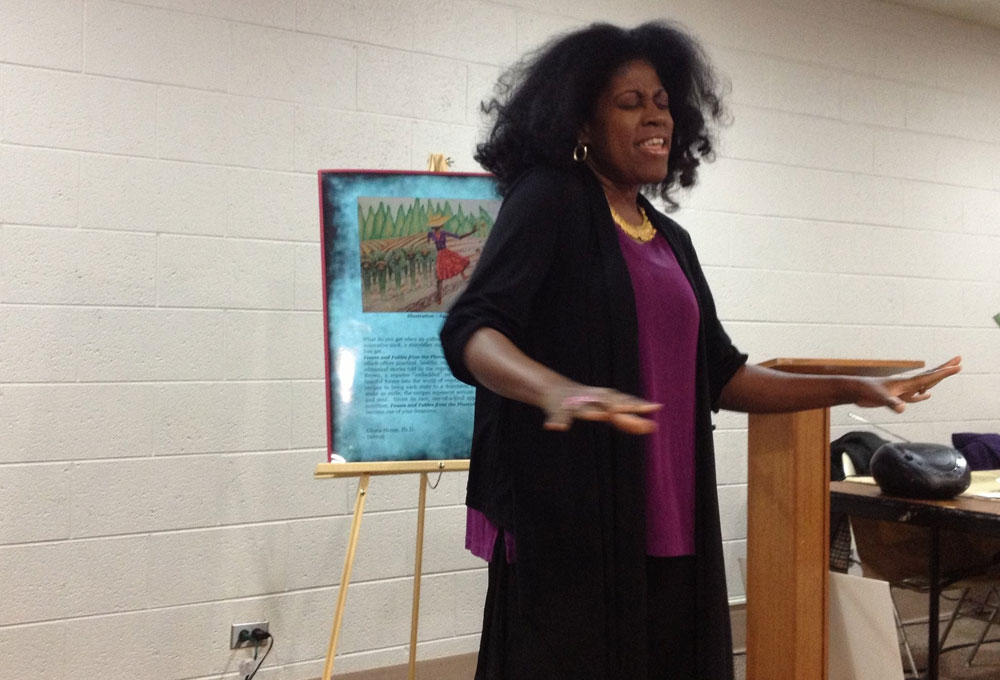
October 8, 2019; Michigan Live
Despite its many trials and tribulations, Flint, Michigan continues to model grassroots leadership development and community building for the rest of the country. The city built on that tradition last week when they named Semaj Brown as their first poet laureate.
Brown is a very special candidate for this position, named at a particular time in Flint’s history. In fact, Pamela Pugh, the Flint mayor’s chief public health advisor, said that community members had asked city officials to create the position with Brown in mind.
In addition to being a lyrical poet, Brown is a trained biologist, a longtime educator, a talented musician, and a devoted community activist. She has education and experience in all of these roles and has demonstrated leadership and skill in each area. She says, “It is all one—it’s all connected in my world.”
Much of Brown’s professional life has been spent on science. After getting her bachelor’s degree in biology, she developed science curricula for Detroit Public Schools, led community health workshops with her husband Dr. James Brown, and authored a radio program and cookbook featuring plant characters promoting more healthful diets.
Michigan Live’s Zahra Ahmed talked about Brown’s childhood and how her mother, pianist Bessie James, made the arts an intimate part of Semaj’s life. Jan Worth-Nelson at East Village Magazine explained how Brown is “part of the ‘progeny’ generation of the Broadside Lotus [Press] family, emerging after the ‘legacy’ poets of the ’60s and ’70s including Dudley Randall, Sonia Sanchez, Haki Madhubuti, Audre Lorde, Etheridge Knight and Gwendolyn Brooks.”
Broadside Lotus Press was formed when the two oldest Black-owned publishing presses in the country merged. They’re a nonprofit whose mission reflects the knowledge that in the 21st century, “power is based on the control and manipulation of knowledge by groups of people,” so they aim to “provide processes, structures and literature to engender and support a literate, politically conscious, socially responsible community capable of giving clear voice to the reality, experiences, needs and struggles of humanity.” Broadside Lotus Press publishes Brown’s poetry collection, Bleeding Fire: Tap the Eternal Spring of Regenerative Light, and also the work of Detroit poet laureate Naomi Long Madgette.
Sign up for our free newsletters
Subscribe to NPQ's newsletters to have our top stories delivered directly to your inbox.
By signing up, you agree to our privacy policy and terms of use, and to receive messages from NPQ and our partners.
Pugh said that officials recommended appointing Brown as laureate as part of the city’s public health, recovery, and resilience programming. As NPQ readers know, Flint became the symbol for a national crisis when the lead levels in its city water rose high enough to poison children. It has since been revealed that many other cities suffer the same problem. Pugh and others talked about how poetry and literature would be part of a more holistic public health movement, and Brown is the ideal person to help lead it.
And that’s where this appointment shows itself to be part of a rising movement. Flint mayor Karen Weaver was recently highlighted by Zora as one the most talented, powerful women of color in politics. Pugh, who awarded Brown her position, is not only Mayor Weaver’s chief public health advisor, she’s also vice president of the state Board of Education and a social justice advocate. Brown’s appointment adds another formidably talented woman of color to the leadership team in Flint.
Cyndi Suarez wrote on Monday about consultant Wilnelia Rivera’s liberatory approach to supporting women of color who run for public office. Rivera said, “You have to understand that she’s more than just this one person. She’s the backbone of her family. She’s the backbone of her community. You have to build a team that’s going to be able to emotionally understand that.”
Brown seems to come right out front with that approach. She said she’s already looking for a grant writer to help her because “I have ambitious goals…I’d like to show how poetry intersects with everything.” She told linguistics professor Erica Britt, “We need to know how to own ourselves. We’ve been trained to be polite, but we also have been trained to have a voice.”
When her appointment was announced, she said, “I can see all kinds of programming, all kinds of poetry, all kinds of word games, for how to bring the children in, all part of creating a value system. There are so many things to be done if we can just LIFT—because we can, together.”
That voice, which sees and hears trauma but returns to hope and joy, permeates much of Brown’s writing. Her poem “Listen Just Listen…” is a great example, as are her public social media posts, addressed to “Beautiful People.” Like Joy Harjo, a Native American poet laureate appointed earlier this year, Brown calls us to see and be better. Thanks to her and others, things seem to be looking up for Flint.—Erin Rubin













